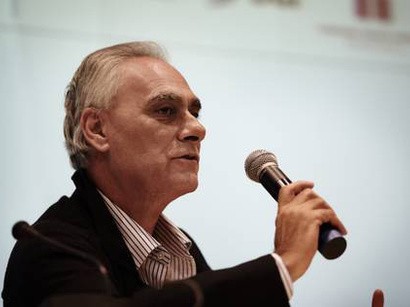This month’s premier league final between Cairo’s two storied clubs, Al-Ahly SC and Al-Zamalek SC, once the world’s most violent derby, was more than a clash between two football giants. It was a clash between management styles and diametrically opposed approaches towards militant, highly politicised, street battle-hardened football fans. The clash highlighted the advantages of engagement as opposed to the risk of radicalisation and escalating political violence.
On the pitch, like on the streets and university campuses of Egypt, Al-Zamalek’s emergence as this year’s Egyptian champion, despite Al-Ahly having won the derby itself, would seem to legitimise the club’s aggressive effort to criminalise its fan base.
The facts on the ground, however, suggest that Al-Ahly’s engagement with its supporters has produced far better results, including greater cooperation with a group that. like its Al-Zamalek counterpart, played a key role in the toppling in 2011 of President Hosni Mubarak and protests against all his successors in the past four years.
Members of Ultras Ahlawy, the Al-Ahly support group, and Ultras White Knights (UWK), the Al-Zamalek fan group, form the core of prominent student and youth groups that have been targeted by the government of general-turned-president Abdel Fattah Al-Sisi, who in 2013 toppled Egypt’s only democratically elected president, Mohammed Morsi, in a military coup. More than a thousand protesters have been killed on Al-Sisi’s watch, while tens of thousands have been incarcerated and thousands expelled from universities.
Al-Zamalek president Mortada Mansour, a larger than life figure, whose at times comical outbursts often persuade the government to maintain a distance even though they support Al-Sisi’s policies, charged that Al-Ahly’s victory on the pitch was due to “ghosts and jinns”, and that his assertions are “written in the holy Quran.”
More seriously, Mansour has identified the UWK and other militant fans or ultras as enemies of the state, aligned with the outlawed Muslim Brotherhood. He succeeded earlier this year in persuading a court to ban ultras as terrorists on par with the Muslim Brotherhood. In February, Mansour took pride in taking responsibility for a confrontation at a Cairo stadium between security forces and fans in which at least 20 supporters were killed.
Mansour, whose hard line mirrors the government’s tough approach towards its opponents, took his battle earlier this month to Al-Ahly after thousands of Ultras Ahlawy were allowed to attend a training of their team in preparation for the derby.
The UWK, whom Mansour accuses of having tried to assassinate him, are barred from Al-Zamalek events. The Al-Ahly fans reportedly used the training to mock Mansour in chants and hurl abuse at him, not only because he heads their arch rival, but as a result of his hard-line anti-ultras, pro-government stance. They also demanded a lifting of the ban on spectators attending football matches that has been in place for much of the four years since the fall of Mubarak.
In response, Mansour accused Al-Ahly president Mahmoud Taha of allowing fans to “terrorise citizens” and of displaying a lack of respect for the ministries of defence, and interior that controls the security forces. The Interior Ministry has been the main driver behind the ban. Mansour said he had filed charges against Al-Ahly president Mahmoud Taher for hosting a terrorist organisation.
Taha refused to be drawn by Mansour, noting in a veiled criticism of the ban on spectators that the ultras had “set an example to follow in terms of discipline, given how they had entered and left the stadium despite their large numbers. Al-Ahly, the leader of Arab and African sports with its titles and trophies, refuses to be drawn into such matters… while stressing its respect for different opinions and views,” Taha said.
While Mansour’s hard line reflects government policy, Taha’s approach proved its value in December, when Ahlawy fans stormed a stadium hours before it was to host an African championship final in support of their demand that they be allowed to attend the match.
In an unprecedented move, Taha stopped security forces from violently evicting the fans and negotiated their peaceful departure in exchange for the Interior Ministry’s agreement to allow them into the stadium during the match. The fans agreed as part of the deal to subject themselves to security checks and not to disrupt the match, a promise they kept.
For a brief moment, the incident held out hope that the government may be persuaded that engagement rather than brutal repression is more likely to reduce tension and prevent radicalisation among frustrated and angry youth who lack social and economic prospects.
Ultimately, the government’s willingness to work with Taha did not indicate a change of heart but a desire to ensure that the match from which Al-Ahly emerged as the continent’s champion went off without a hitch.
If Taha’s football-focused approach has proven that engagement produces results, Mansour and the government’s insistence on brutal confrontation risks further escalation in a country that is fighting an armed insurgency in the Sinai and is witnessing the sprouting of militant urban groups that target security and judicial authorities.
“We had high hopes. We staged the revolution in 2011. The new generation has nothing to lose. We recognise that football is political. That’s why we are involved not only in football but also in politics. We oppose the brutality of this regime and its pawns. Neither Al-Sisi nor Mansour are interested in politics. Their language is exclusively the language of repression,” said an ultra who is also a student leader.
James M. Dorsey is a senior fellow at the S. Rajaratnam School of International Studies as Nanyang Technological University in Singapore, co-director of the Institute of Fan Culture of the University of Würzburg and the author of the blog, The Turbulent World of Middle East Soccer, and a forthcoming book with the same title.

